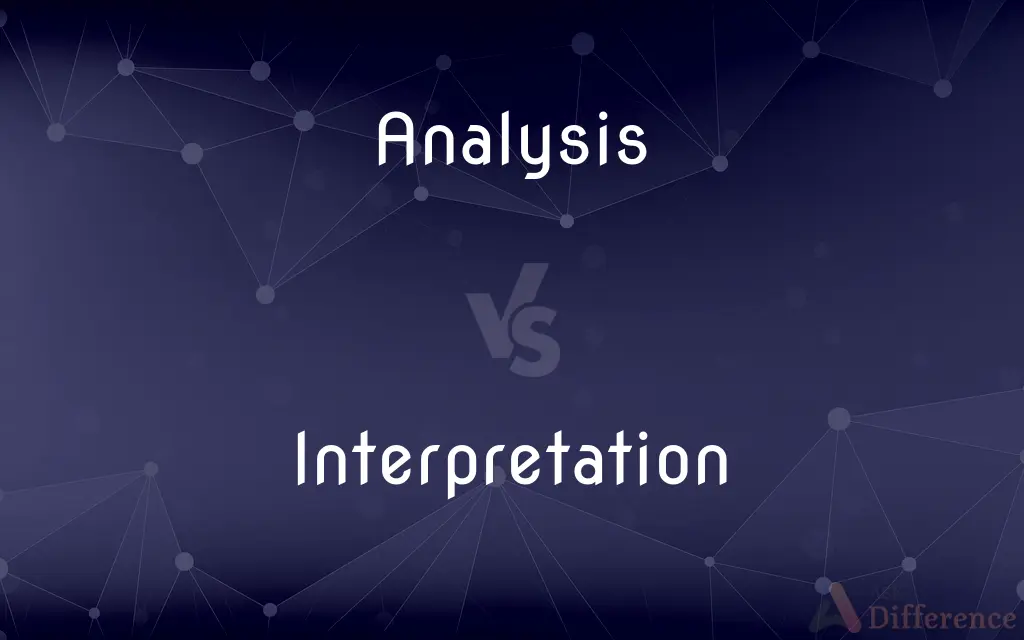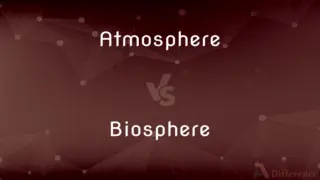Analysis vs. Interpretation — What's the Difference?
By Tayyaba Rehman — Updated on November 4, 2023
Analysis is the process of examining components or structure, while interpretation is assigning meaning or value.

Difference Between Analysis and Interpretation
Table of Contents
ADVERTISEMENT
Key Differences
Analysis involves breaking down a complex topic or substance into smaller parts to gain a better understanding of it, while interpretation is the act of explaining, reframing, or presenting a personal perspective on something. Analysis is typically objective and methodical, focusing on the how and what of the subject. Interpretation, on the other hand, is subjective, emphasizing the why and the implications. In analysis, one seeks to understand the elements and their relationships within a system. Interpretation goes a step further to derive significance, implications, or potential consequences of the information analyzed.
When analyzing a text, one might look for themes, structure, and literary devices. Interpretation then takes these findings to speculate on the deeper meaning or message of the text. Analysis can be seen as a technical dissection, while interpretation is more akin to an art form, drawing on personal insight and experience. Where analysis may strive for a singular conclusion based on evidence, interpretation acknowledges that multiple meanings are possible and explores them.
Analysis examines data or content with the goal of clarifying its parts and systems. Interpretation expresses what the data or content reveals about broader contexts or truths. In the realm of analysis, you might count occurrences of a word in a document to identify patterns. Interpretation would then take those patterns to suggest an author’s intent or the cultural significance of those patterns. Analysis often relies on established criteria or standards; interpretation is more about inferential thinking and making connections to wider contexts.
The scientific method is heavily based on analysis, requiring repeatable results and systematic investigation. Interpretation, while it can be informed by scientific analysis, often enters the domains of philosophy, art, and personal meaning, where the same data can lead to different conclusions based on the interpreter's perspective. Analysis sorts out the facts and details, while interpretation is concerned with the nuances and underlying messages that might be conveyed by those facts and details.
Comparison Chart
Focus
Details and structure of content.
The meaning or significance derived from content.
ADVERTISEMENT
Nature
Objective and methodical.
Subjective and inferential.
Goal
To understand components and systems.
To assign meaning or value.
Method
Systematic dissection.
Creative synthesis.
Outcome
Factual conclusions.
Personal or varied conclusions.
Compare with Definitions
Analysis
Examination
The scientist's analysis of the sample revealed a new compound.
Interpretation
Rendering
The actor's interpretation of Hamlet was unique and modern.
Analysis
Breakdown
Through analysis, the complex theory became understandable.
Interpretation
Explanation
His interpretation of the poem uncovered hidden themes.
Analysis
Study
Her analysis of the historical texts provided new insights into the period.
Interpretation
Understanding
The interpretation of the law by the judge set a new precedent.
Analysis
Analysis is the process of breaking a complex topic or substance into smaller parts in order to gain a better understanding of it. The technique has been applied in the study of mathematics and logic since before Aristotle (384–322 B.C.), though analysis as a formal concept is a relatively recent development.The word comes from the Ancient Greek ἀνάλυσις (analysis, "a breaking-up" or "an untying;" from ana- "up, throughout" and lysis "a loosening").
Interpretation
Translation
Her interpretation from French to English was flawless.
Analysis
Detailed examination of the elements or structure of something
Statistical analysis
An analysis of popular culture
Interpretation
Perspective
The critic's interpretation of the film sparked much debate.
Analysis
Short for psychoanalysis
Other schools of analysis have evolved out of the original disciplines established by Freud
Interpretation
The act or process of interpreting.
Analysis
The separation of an intellectual or material whole into its constituent parts for individual study.
Interpretation
A result of interpreting.
Analysis
The study of such constituent parts and their interrelationships in making up a whole.
Interpretation
An explanation or conceptualization by a critic of a work of literature, painting, music, or other art form; an exegesis.
Analysis
A spoken or written presentation of such study
Published an analysis of poetic meter.
Interpretation
A performer's distinctive personal version of a song, dance, piece of music, or role; a rendering.
Analysis
The separation of a substance into its constituent elements to determine either their nature (qualitative analysis) or their proportions (quantitative analysis).
Interpretation
(countable) An act of interpreting or explaining something unclear; a translation; a version.
The interpretation of a dream, or of an enigma
The interpretation of the rules
Analysis
The stated findings of such a separation or determination.
Interpretation
(countable) A sense given by an interpreter; an exposition or explanation given; meaning.
Commentators give various interpretations of the same passage of Scripture.
Analysis
A branch of mathematics principally involving differential and integral calculus, sequences, and series and concerned with limits and convergence.
Interpretation
The discipline or study of translating one spoken or signed language into another (as opposed to translation, which concerns itself with written language).
Analysis
The method of proof in which a known truth is sought as a consequence of a series of deductions from that which is the thing to be proved.
Interpretation
(uncountable) The power of explaining.
Analysis
(Linguistics) The use of function words such as prepositions, pronouns, or auxiliary verbs instead of inflectional endings to express a grammatical relationship; for example, the cover of the dictionary instead of the dictionary's cover.
Interpretation
(countable) An artist's way of expressing his thought or embodying his conception of nature.
Analysis
Psychoanalysis.
Interpretation
(countable) An act or process of applying general principles or formulae to the explanation of the results obtained in special cases.
Analysis
Systems analysis.
Interpretation
An approximation that allows aspects of a mathematical theory to be discussed in ordinary language.
Analysis
(countable) Decomposition into components in order to study (a complex thing, concept, theory etc.).
Interpretation
An assignment of a truth value to each propositional symbol of a propositional calculus.
Analysis
(countable) The result of such a process.
Interpretation
Heritage interpretation
Analysis
The mathematical study of functions, sequences, series, limits, derivatives and integrals.
Mathematical analysis
Interpretation
The act of interpreting; explanation of what is obscure; translation; version; construction; as, the interpretation of a foreign language, of a dream, or of an enigma.
Look how we can, or sad or merrily,Interpretation will misquote our looks.
Analysis
Proof by deduction from known truths.
Interpretation
The sense given by an interpreter; exposition or explanation given; meaning; as, commentators give various interpretations of the same passage of Scripture.
Analysis
The process of breaking down a substance into its constituent parts, or the result of this process.
Interpretation
The power or explaining.
Analysis
The analytical study of melodies, harmonies, sequences, repetitions, variations, quotations, juxtapositions, and surprises.
Interpretation
An artist's way of expressing his thought or embodying his conception of nature.
Analysis
Psychoanalysis.
Interpretation
The act or process of applying general principles or formulæ to the explanation of the results obtained in special cases.
Analysis
A resolution of anything, whether an object of the senses or of the intellect, into its constituent or original elements; an examination of the component parts of a subject, each separately, as the words which compose a sentence, the tones of a tune, or the simple propositions which enter into an argument. It is opposed to synthesis.
Interpretation
A mental representation of the meaning or significance of something
Analysis
The separation of a compound substance, by chemical processes, into its constituents, with a view to ascertain either (a) what elements it contains, or (b) how much of each element is present. The former is called qualitative, and the latter quantitative analysis.
Interpretation
The act of interpreting something as expressed in an artistic performance;
Her rendition of Milton's verse was extraordinarily moving
Analysis
The tracing of things to their source, and the resolving of knowledge into its original principles.
Interpretation
An explanation that results from interpreting something;
The report included his interpretation of the forensic evidence
Analysis
The resolving of problems by reducing the conditions that are in them to equations.
Interpretation
An explanation of something that is not immediately obvious;
The edict was subject to many interpretations
He annoyed us with his interpreting of parables
Often imitations are extended to provide a more accurate rendition of the child's intended meaning
Analysis
A syllabus, or table of the principal heads of a discourse, disposed in their natural order.
Analysis
The process of ascertaining the name of a species, or its place in a system of classification, by means of an analytical table or key.
Analysis
An investigation of the component parts of a whole and their relations in making up the whole
Analysis
The abstract separation of a whole into its constituent parts in order to study the parts and their relations
Analysis
A form of literary criticism in which the structure of a piece of writing is analyzed
Analysis
The use of closed-class words instead of inflections: e.g., `the father of the bride' instead of `the bride's father'
Analysis
A branch of mathematics involving calculus and the theory of limits; sequences and series and integration and differentiation
Analysis
A set of techniques for exploring underlying motives and a method of treating various mental disorders; based on the theories of Sigmund Freud;
His physician recommended psychoanalysis
Analysis
Investigation
The crime scene's analysis took hours but yielded many clues.
Analysis
Evaluation
His analysis of the market trends was spot on.
Common Curiosities
Can analysis exist without interpretation?
Analysis can stand alone as the examination of details, but interpretation gives those details meaning.
What does analysis typically involve?
Analysis involves examining and breaking down information into components.
Can analysis be subjective?
Analysis is generally objective, focusing on factual evidence and logical reasoning.
How does interpretation affect the understanding of art?
Interpretation can provide multiple angles and depths of understanding in art.
Is interpretation always correct?
Interpretation is not about being correct, but about presenting a plausible perspective.
Are analysis and interpretation only used in academic fields?
No, they are used in various fields, including business, science, and the arts.
Can interpretations be debated?
Yes, interpretations often lead to discussions and debates due to their subjective nature.
What is the purpose of interpretation?
Interpretation aims to find meaning or significance in information.
Is interpretation based on personal perspective?
Yes, interpretation is often influenced by personal insight and context.
Is there a right way to interpret something?
While there are informed interpretations, there's rarely one "right" way to interpret anything.
What is an example of analysis in literature?
Analyzing the symbolism in a story is an example of literary analysis.
What skills are important for analysis?
Critical thinking and attention to detail are key skills for analysis.
How does one improve their analysis abilities?
Practice, education, and experience can improve one's analytical abilities.
Does interpretation vary among different people?
Yes, interpretation can vary widely based on individual perspectives.
Can interpretation change over time?
Yes, as contexts and perspectives shift, interpretations can also change.
Share Your Discovery

Previous Comparison
Autecology vs. Ecology
Next Comparison
Atmosphere vs. BiosphereAuthor Spotlight
Written by
Tayyaba RehmanTayyaba Rehman is a distinguished writer, currently serving as a primary contributor to askdifference.com. As a researcher in semantics and etymology, Tayyaba's passion for the complexity of languages and their distinctions has found a perfect home on the platform. Tayyaba delves into the intricacies of language, distinguishing between commonly confused words and phrases, thereby providing clarity for readers worldwide.















































